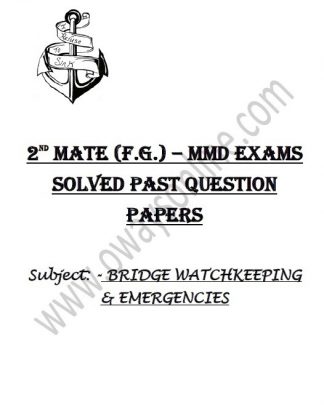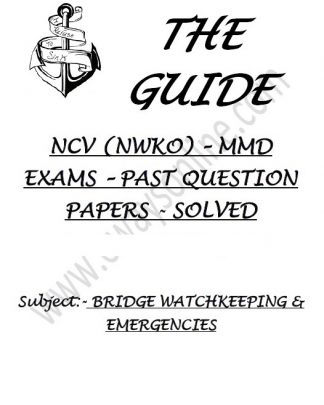Ship Reporting System (SRS):
- A ship reporting system enables the SMC to quickly:
- Identify vessels in the vicinity of a distress situation, along with their positions, courses, and speeds
- Be aware of other information about the vessels, which may be valuable (whether a doctor is aboard, etc.)
- Know how to contact the vessels
- Masters of vessels are urged to send regular reports to the authority operating a ship reporting system for SAR.
The Automated Mutual-Assistance Vessel Rescue (AMVER) System:-
- AMVER is a worldwide system operated exclusively to support SAR and make information available to all RCCS.
- There is no charge for vessels to participate in, nor for RCCs to use AMVER
- Many land-based providers of communications services world-wide relay ship reports to AMVER free of charge.
- Any merchant vessel of 1,000 gross tons or more on any voyage of greater than 24 hours is welcome to participate.
- Benefits of participation include:
- Improved likelihood of rapid aid during emergencies
- Reduced number of calls for assistance to vessels unfavorably located to respond
- Reduced response time to provide assistance.
Types of Reports does a ship need to send out:
Reports should be sent as follows:
- Sailing plan (SP) – Before or as near as possible to the time of departure from a port within a reporting system or when entering the area covered by a system.
- Position report (PR) – When necessary to ensure effective operation of the system.
- Deviation report (DR) – When the ship’s position varies significantly from the position that would have been predicted from previous reports, when changing the reported route, or as decided by the master.
- Final report (FR) – On arrival at destination and when leaving the area covered by a system.
- Dangerous goods report (DG) – When an incident takes place involving the loss or likely loss overboard of packaged dangerous goods, including those in freight containers, portable tanks, road and rail vehicles and shipborne barges, into the sea.
- Harmful substances report (HS) – When an incident takes place involving the discharge or probable discharge of oil (Annex I of MARPOL) or noxious liquid substances in bulk (Annex II of MARPOL).
- Marine pollutants report (MP) – In the case of loss or likely loss overboard of harmful substances in packaged form, including those in freight containers, portable tanks, road and rail vehicles and shipborne barges, identified in the International Maritime Dangerous Goods Code as marine pollutants (Annex III of MARPOL).
- Any other report – Any other report should be made in accordance with the system procedures as notified in accordance with paragraph 9 of the General Principles.
Importance of Ship Reporting Systems for safe navigation:
- Ship reporting systems contribute to safety of life at sea, safety and efficiency of navigation and/or protection of the marine environment. A ship reporting system, when adopted and implemented in accordance with the guidelines and criteria developed by the Organization pursuant to this regulation, shall be used by all ships, or certain categories of ships or ships carrying certain cargoes in accordance with the provisions of each system so adopted.
- The Organization is recognized as the only international body for developing guidelines, criteria and regulations on an international level for ship reporting systems. Contracting Governments shall refer proposals for the adoption of ship reporting systems to the Organization. The Organization will collate and disseminate to Contracting Governments all relevant information with regard to any adopted ship reporting system.
- The initiation of action for establishing a ship reporting system is the responsibility of the Government or Governments concerned. In developing such systems provision of the guidelines and criteria developed by the Organization shall be taken into account.
- Ship reporting systems not submitted to the Organization for adoption do not necessarily need to comply with this regulation. However, Governments implementing such systems are encouraged to follow, wherever possible, the guidelines and criteria developed by the Organization. Contracting Governments may submit such systems to the Organization for recognition.
- Where two or more Governments have a common interest in a particular area, they should formulate proposals for a co-ordinated ship reporting system on the basis of agreement between them. Before proceeding with a proposal for adoption of a ship reporting system, the Organization shall disseminate details of the proposal to those Governments which have a common interest in the area covered by the proposed system. Where a co-ordinated ship reporting system is adopted and established, it shall have uniform procedures and operations.
- After adoption of a ship reporting system in accordance with this regulation, the Government or Governments concerned shall take all measures necessary for the promulgation of any information needed for the efficient and effective use of the system. Any adopted ship reporting system shall have the capability of interaction and the ability to assist ships with information when necessary. Such systems shall be operated in accordance with the guidelines and criteria developed by the Organization pursuant to this regulation.
- The master of a ship shall comply with the requirements of adopted ship reporting systems and report to the appropriate authority all information required in accordance with the provisions of each such system.
- All adopted ship reporting systems and actions taken to enforce compliance with those systems shall be consistent with international law, including the relevant provisions of the United Nations Convention on the Law of the Sea.
- Nothing in this regulation or its associated guidelines and criteria shall prejudice the rights and duties of Governments under international law or the legal regimes of straits used for international navigation and archipelagic sea lanes.
- The participation of ships in accordance with the provisions of adopted ship reporting systems shall be free of charge to the ships concerned.
- The Organization shall ensure that adopted ship reporting systems are reviewed under the guidelines and criteria developed by the Organization.
Explanation of how the ship reporting system provides the necessary information for search & rescue in case of distress:
Ship Reporting System:-
- A ship reporting system enables the SMC to quickly:
- identify vessels in the vicinity of a distress situation, along with their positions, courses, and speeds
- be aware of other information about the vessels, which may be valuable (whether a doctor is aboard, etc.)
- know how to contact the vessels.
- Masters of vessels are urged to send regular reports to the authority operating a ship reporting system for SAR.
The Automated Mutual-Assistance Vessel Rescue (AMVER) System:-
- AMVER is a worldwide system operated exclusively to support SAR and make information available to all RCCS.
- there is no charge for vessels to participate in, nor for RCCs to use AMVER
- many land-based providers of communications services world-wide relay ship reports to AMVER free of charge.
- Any merchant vessel of 1,000 gross tons or more on any voyage of greater than 24 hours is welcome to participate.
- Benefits of participation include:
- improved likelihood of rapid aid during emergencies
- reduced number of calls for assistance to vessels unfavorably located to respond
- reduced response time to provide assistance.
Short notes on INSPIRES with respect to Ship Reporting System:
INDIAN Ship position and information reporting system (INSPIRES) :
Indian navy in co-ordination with DG of Shipping has established INSPIRES to exercise effective open ocean vessel management, to provide security to vessel, weather forecast to enhance safety of navigation and monitor incidence of pollution. An Indian Naval communication center (COMCENs) Mumbai and Vizag are functioning as the shore stations for receiving INSPIRES messages from vessels. All Indian vessels including coasting/ fishing vessels of tonnage 300 GRT and above shall participate in this reporting system. All vessels other than Indian ships of tonnage 100 GRT and above are encouraged to participate in this reporting system.
INDIAN SHIP REPORTING SYSTEM:
INDIAN SHIP POSITION AND INFORMATION REPORTING SYSTEM (INSPIRES) SHIP REPORTING SYSTEM FOR SAR (INDSAR):
The INSPIRES has been established to achieve the following objectives:
- To provide up to date information on shipping for search and rescue.
- For effective vessel traffic management service.
- For weather forecasting.
- For prevention and containment of marine pollution.
This reporting system has wider area of coverage in the Indian Ocean. An Indian Naval Communication Centre (COMCENs) Mumbai and Vishakhapatnam are functioning as the shore stations for receiving INSPIRES messages from all vessels.

